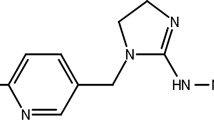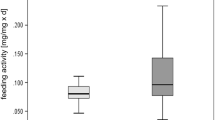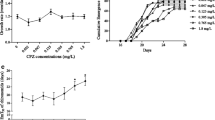Abstract
The objective of this study was to analyze the sublethal effects of propiconazole on Deuterodon iguape, a native fish common in Brazil, which has potential for aquaculture and use as a bioindicator. The hypothesis was to test whether D. iguape has a metabolism similar to Danio rerio so that its use in bioassays may be validated. Lethal concentration (LC50) and metabolic rates were studied in fish exposed to propiconazole. Specific oxygen consumption and ammonia excretion for D. iguape and D. rerio increased by 0.01 µg L−1 and then decreased as the propiconazole concentration increased. The decrease in the averages of specific oxygen consumption at the concentration of 0.1 µg L−1 represented a reduction in the metabolic rate compared to the control of 71% for D. iguape and 40% D. rerio. For the ammonia excretion, at the same concentration, there was a reduction of 68.7% and 45.4% for D. iguape and D. rerio, respectively. When comparing ammonia excretion of the two species for each concentration of propiconazole, there was a significant difference (p < 0.05) in relation to the control and for the highest concentration (0.1 µg L−1). As for specific oxygen consumption, there was a statistically significant difference only for the concentration of 0.1 µg L−1. D. iguape proved to be a good and useful bioindicator for ichthyologists or ecologists in studies of moderate pesticide contamination in freshwater aquatic environments, as its metabolic response was similar to D. rerio.



Similar content being viewed by others
Data availability
The datasets used and/or analyzed during the current study are available from the corresponding author on reasonable request.
Code availability (software application or custom code)
Not applicable in this section.
References
Adams SM (1990) Status and use of biological indicators for evaluating the effects of stress on fish. Am Fish Soc Symposium 8:1–8
Amsterdam A, Hopkins N (2006) Mutagenesis strategies in zebrafish for identifying genes involved in development and disease. Trends Genet 22:473–478. https://doi.org/10.1016/j.tig.2006.06.011
Areechon N, Plumb JA (1990) Sublethaf effects of malathion on Chanel a catfish IctalurusPunctatus. B Environ Contam Tox 44:435–442. https://doi.org/10.1007/BF01701226
Arias ARL, Buss DF, Albuquerque C, Inácio AF, Freire MM, Egler M, Mugnai R, Baptista DF (2007) Utilização de bioindicadores na avaliação de impacto e no monitoramento da contaminação de rios e córregos por agrotóxicos. Cien Saude Colet 12:61–72. https://doi.org/10.1590/S1413-81232007000100011
Barbazuk WB, Korf I, Kadavi C, Heyen J, Tate S, Wun E, Bedell JA, McPherson JA, Johnson SL (2000) The syntenic relationship of the zebrafish and human genomes. Genome Res 10:1351–1358. https://doi.org/10.1101/gr.144700
Barbieri E (2007) Use of metabolism and swimming activity to evaluate the sublethal toxicity of surfactant (LAS-C12) on Mugil platanus. Braz Arch Biol Technol 50:101–112. https://doi.org/10.1590/S1516-89132007000100012
Barbieri E (2008) Effect of 2,4-D herbicide (2,4-dichlorophenoxyacetic acid) on oxygen consumption and ammonium excretion of juveniles of Geophagus brasiliensis (Quoy & Gaimard, 1824) (Osteichthyes, Cichlidae). Ecotoxicology 18:55–60. https://doi.org/10.1007/s10646-008-0256-3
Barbieri E, Ferreira LAA (2011) Effects of the organophosphate pesticide Folidol 600 (R) on the freshwater fish, Nile tilapia (Oreochromis niloticus). Pestic Biochem Phys 99:209–214. https://doi.org/10.1016/j.pestbp.2010.09.002
Barbieri E, Doi SA (2012) Acute toxicity of ammonia on juvenile Cobia (Rachycentroncanadum, Linnaeus, 1766) according to the salinity. Aquacult Int 20:373–382. https://doi.org/10.1007/s10499-011-9467-3
Barbieri E, Ferrarini AMT, Rezende KFO, Martinez DST, Alves OL (2019) Effects of multiwalled carbon nanotubes and carbofuran on metabolism in Astyanax ribeirae, a native species. Fish Physiol Biochem 45:417–426. https://doi.org/10.1007/s10695-018-0573-2
Barrera-Méndez F, Miranda-Sánchez D, Sánchez-Rangel D, Bonilla-Landa I, Rodríguez-Haas B, Monribot-Villanueva JB, Olivares-Romero JL (2019) Propiconazole nanoencapsulation in biodegradable polymers to obtain pesticide controlled delivery systems. J Mex Chem Soc 63:50–60. https://doi.org/10.29356/jmcs.v63i1.564
Baun A, Jensen SD, Bjerg PL, Christensen TH, Nyholm N (2000) Toxicity of organic chemical pollution in groundwater downgradient of a landfill (Grindsted, Denmark). Environ Toxicol Chem 34:1647–1652. https://doi.org/10.1021/es9902524
Bombardelli RA, Hayashi C (2005) Masculinização de larvas de tilápia do Nilo (Oreochromis niloticus) a partir de banhos de imersão com 17α-metiltestosterona. R Bras Zootec 34: 365-372. https://www.scielo.br/pdf/rbz/v34n2/25446.pdf
Bueno-Krawczyk ACD, Guiloski IC, Piancini LDS, Azevedo JC, Ramsdorf WA, Guimarães ATB, Cestari MM, Silva de Assis HC (2015) Multibiomarker in fish to evaluate a river used to water public supply. Chemosphere 135:257–264. https://doi.org/10.1016/j.chemosphere.2015.04.064
Campos-Garcia J, Martinez DST, Rezende KFO, Da Silva JRMC, Alves OL, Barbieri E (2016) Histopathological alterations in the gills of Nile tilapia exposed to carbofuran and multiwalled carbon nanotubes. Ecotox Environ Safe 133:481–488. https://doi.org/10.1016/j.ecoenv.2016.07.041
Cobas M, Meijide J, Sanromán M, Pazos M (2016) Chestnut shells to mitigate pesticide contamination. J Taiwan Inst Chem Eng 61:166–173. https://doi.org/10.1016/j.jtice.2015.11.026
Cort CCWD, Ghisi NC (2014) Uso de alterações morfológicas nucleares em Astyanax spp. para avaliação da contaminação aquática. Mundo Saúde 38:31–39. https://doi.org/10.15343/0104-7809.20143801031039
Damato M, Barbieri E (2012) Study on the acute toxicity and metabolic changes caused by cadmium exposure on the fish Hyphessobrycon callistus used as an indicator of environmental health. Mundo Saúde 36:574–581. https://doi.org/10.15343/0104-7809.2012364574580
Ferrarini AMT, Rezende KFO, Barbieri E (2016) Use of swimming capacity to evaluate the effect of mercury on Poecilia vivipara (Poecilídeos) according to salinity and temperature. J Mar Biolo Oceanogr 5:1–5. https://doi.org/10.4172/2324-8661.1000163
Erbe MCL, Ramsdorf WA, Vicari T, Cestari MM (2010) Toxicity evaluation of water samples collected near a hospital waste landfill through bioassays of genotoxicity piscine micronucleus test and comet assay in fish Astyanax and ecotoxicity Vibrio fischeri and Daphnia magna. Ecotoxicology 20:320–328. https://doi.org/10.1007/s10646-010-0581-1
Fonseca T, Costa-Pierce BA, Valenti WC (2017) Lambari aquaculture as a means for the sustainable development of rural communities in Brazil. Rev Fish Sci Aquac 25:316–330. https://doi.org/10.1080/23308249.2017.1320647
Friberg N, Lindstrøm M, Kronvang B, Larsen SE (2003) Macroinvertebrate/sediment relationships along a pesticide gradient in Danish streams. Hydrobiologia 494:103–110. https://doi.org/10.1007/978-94-017-3366-3_15
Galvan GL, Lirola JR, Felisbino K, Vicari T, Yamamoto CI, Cestari MM (2016) Genetic and hematologic endpoints in Astyanax altiparanae (Characidae) after exposure and recovery to water-soluble fraction of gasoline (WSFG). B Environ Contam Tox 97:63–70. https://doi.org/10.1007/s00128-016-1816-5
Garrison AW, Avants JK, Miller RD (2011) Loss of propiconazole and its four stereoisomers from the water phase of two soil-water slurries as measured by capillary electrophoresis. Int J Environ Res Public Health 8:3453–3467. https://doi.org/10.3390/ijerph8083453
Ghormade V, Deshpande MV, Paknikar KM (2011) Perspectives for nano-biotechnology enabled protection and nutrition of plants. Biotechnol Adv 29:792–803. https://doi.org/10.1016/j.biotechadv.2011.06.007
Guzmán-Guillén R, Prieto Ortega AI, Gutiérrez-Praena D, Moreno IM, Movano R, Blanco A, Cameán AM (2015) Vitamin E pretreatment prevents histopathological effects in tilapia (Oreochromis niloticus) acutely exposed tocylindrospermopsin. Environ Toxicol 32:1469–1485. https://doi.org/10.1002/tox.22152
Hamilton MA, Russo RC, Thurston RV (1978) Trimmed Spearman-Karber method for estimating median lethal concentrations in toxicity bioassays. Environ Sci Technol 12:417. https://doi.org/10.1021/es60140a017
Hanada R, Gasparotto L, Moreira A (2015) Avaliação da sensibilidade de Mycosphaerella fijiensis oriundos de plátanos aos fungicidas propiconazole e azoxystrobina. Rev Cienc Agrar 58:21–26. https://doi.org/10.4322/rca.1697
Heath AG, Cech JJ, Zinkl JG, Steele MD (1993) Sublethal effects of three pesticides on Japanese medaka. Arch Environ Contam Toxicol 25:485–491. https://doi.org/10.1007/BF00214337
Hemalatha D, Muthukumar A, Rangasamy B, Bojan N, Ramesh M (2016) Impact of sublethal concentration of a fungicide propiconazole on certain health biomarkers of Indian major carp Labeo rohita. Biocatal Agric Biotechnol 8:321–327. https://doi.org/10.1016/j.bcab.2016.10.009
Henriques MB, Fagundes L, Petesse ML, Silva NJR, Rezende KFO, Barbieri E (2018) Lambari fish Deuterodon iguape Eigenmann 1907 as an alternative to live bait for estuarine recreational fishing. Fish Manag Ecol 25:400–407. https://doi.org/10.1111/fme.12308
Henriques MB, Carneiro JS, Fagundes L, Castilho-Barros L, Barbieri E (2019) Economic feasibility for the production of live baits of lambari (Deuterodon iguape) in recirculation system. Bol Inst Pesca 45:e516. https://doi.org/10.20950/1678-2305.2019.45.4.516
Hernández-Moreno D, Pérez-López M, Soler F, Gravato C, Guilhermino L (2011) Effects of carbofuran on the sea bass (Dicentrarchus labrax L.): Study of biomarkers and behaviour alterations. Ecotox Environ Safe 74:1905–1912. https://doi.org/10.1016/j.ecoenv.2011.07.016
Kahle M, Buerge IJ, Hauser A, Muller MD, Poiger T (2008) Azole fungicides: occurrence and fate in wastewater and surface waters. Environ Sci Technol 42:7193–7200. https://doi.org/10.1021/es8009309
Keshari V, Adeeb B, Simmons AE, Simmons TW, Diep CQ (2016) Zebrafish as a model to assess the teratogenic potential of nitrite. J vis Exp 108:e53615. https://doi.org/10.3791/53615
Koroleff F (1970) Direct determination of ammonia in natural waters as indophenol blue. Information on techniques and methods for seawater analysis (and laboratory report). J Cons Int Explor Mer 3:19–22
Kreuger J (1998) Pesticides in stream water within an agricultural catchment in southern Sweden, 1990–1996. Sci Total Environ 216:227–251. https://doi.org/10.1016/s0048-9697(98)00155-7
Kronvang B, Laubel A, Larsen SE, Friberg N (2003) Pesticides and heavy metals in Danish streambed sediment. Hydrobiologia 494:93–101. https://doi.org/10.1023/A:1025441610434
Lanchote VF, Bonato PS, Cerdeira AL, Santos NA, Carvalho D, Gomes MA (2000) HPLC screening and GC-MS confirmation of triazine herbicides residues in drinking water from sugar cane area in Brazil. Water Air Soil Pollut 118:329–337. https://doi.org/10.1023/A:1005147405509
Lopes FP, Pereira BF, Alves RMS, Valim JRT, Figueiredo FAT, Pitol DL, Caetano FH (2017) Ultramorphological changes in gill rakers of Astyanax altiparanae (Characidae) kept in contaminated environments. Fish Physiol Biochem 43:1033–1041. https://doi.org/10.1007/s10695-017-0350-7
Martinez DST, Alves OL, Barbieri E (2013) Carbon nanotubes enhanced the lead toxicity on the freshwater fish. J Phys Conf Ser 429:012043. https://doi.org/10.1088/1742-6596/429/1/012043
Melo KM, Oliveira R, Grisolia CK, Domingues I, Pieczarka JC, de Souza FJ, Nagamachi CY (2015) Short-term exposure to low doses of rotenone induces developmental, biochemical, behavioral, and histological changes in fish. Environ Sci Pollut Res Int 22:13926–13938. https://doi.org/10.1007/s11356-015-4596-2
Mommsen TP (1998) Growth and metabolism. In: Evans D (ed) The Physiology of Fishes, Second edititon. CRC Press, Boca Raton, pp 65–100
Ouadah-Boussouf N, Babin PJ (2016) Pharmacological evaluation of the mechanisms involved in increased adiposity in zebrafish triggered by the environmental contaminant tributyltin. Toxicol Appl Pharmacol 294:32–42. https://doi.org/10.1016/j.taap.2016.01.014
Rand GM, Petrocelli SR (1985) Fundamentals of aquatic toxicology: methods and applications. United States: p. 335–373
Rezende KFO, Bergami E, Alves KVB, Corsi I, Barbieri E (2018) Titanium dioxide nanoparticles alters routine metabolism and causes histopathological alterations in Oreochromisniloticus. Bol Inst Pesca 44:e343. https://doi.org/10.20950/1678-2305.2018.343
Ruíz-Hidalgo K, Masís-Mora M, Barbieri E, Carazo-Rojas E, Rodríguez-Rodríguez CE (2016) Ecotoxicological analysis during the removal of carbofuran in fungal bio augmented matrices. Chemosphere 144:864–871. https://doi.org/10.1016/j.chemosphere.2015.09.056
Sabik H, Jeannot R, Rondeau B (2000) Multiresidue methods using solid-phase, extraction techniques for monitoring priority pesticides, including triazines and degradation products, in ground and surface waters. J Chromatogr A 885:217–236. https://doi.org/10.1016/S0021-9673(99)01084-5
Satapute PP, Kaliwal BB (2018) Burkholderia Sp. strain BBK_9: a potent agent for propiconazole degradation. In: Bidoia ED, Montagnolli RN (eds) Toxicity and Biodegradation Testing, Methods in Pharmacology and Toxicology. Humana Press, New York, pp 87–108
Spence R, Gerlach G, Lawrence C, Smith C (2008) The behavior and ecology of the zebrafish, Danio rerio. Biol Rev Camb Philos Soc 83:13–34. https://doi.org/10.1111/j.1469-185X.2007.00030.x
Statista (2018) Banana production in Brazil. https://www.statista.com/statistics/987946/banana-production-volume-brazil/. Accessed 26 Dec 2020
Tabassum H, Dawood AQ, Sharma P, Khan J, Raisuddin S, Parvez S (2016) Multi-organ toxicological impact of fungicide propiconazole on biochemical and histological profile of freshwater fish Channa punctata Bloch. Ecol Indic 63:359–365. https://doi.org/10.1016/j.ecolind.2015.11.052
Teng M, Zhao F, Zhou Y, Yan S, Tian S, Yan J, Meng Z, Bi S, Wang C (2019) Effect of propiconazole on the lipid metabolism of zebrafish embryos (Danio rerio). J Agric Food Chem 67:4623–4631. https://doi.org/10.1021/acs.jafc.9b00449
Van der Oost R, Beyer J, Vermeulen NPE (2003) Fish bioaccumulation and biomarkers in environmental risk assessment: a review. Environ Toxicol Pharmacol 13:149–157. https://doi.org/10.1016/S1382-6689(02)00126-6
Vargas VMF, Guidobono RR, Henriques JAP (1991) Genotoxicity of plant extracts. Mem Inst Oswaldo Cruz 86:67–70. https://doi.org/10.1590/S0074-02761991000600017
Wilfriel P (2005) Directory of microbicides for the protection of materials: a handbook. Ed. Wilfried Paulus, Springer
Winkler LW (1888) Methods for measurement of dissolved oxygen. Ber Dtsch Chem Ges 21:2843–2854. https://doi.org/10.1002/cber.188802102122
Wu QL, Riise G, Kretzschmar R (2003) Size distribution of organic matter and associated propiconazole in agricultural runoff material. J Environ Qual 32:2200–2206. https://doi.org/10.2134/jeq2003.2200
Zagatto PA, Bertoletti E (2010) Ecotoxicologia Aquática - Princípios e Aplicações, 2 ed. Editora Rima, São Paulo, pp 1–13
Funding
This study was financially supported by the Fundação de Amparo à Pesquisa do Estado de São Paulo (FAPESP)—São Paulo Research Foundation (process 2018/19747–2) and the National Council for Scientific and Technological Development (CNPq, Brazil, for the productivity research grant, process no. 302705/2020–1).
Author information
Authors and Affiliations
Contributions
MBH analyzed and interpreted data, was a major contributor in writing the manuscript, and was the author who submitted the manuscript. KFOR analyzed and interpreted data and was a contributor in writing the manuscript. LCB performed the statistical analysis and was a contributor in writing the manuscript. EB analyzed and interpreted data and was an important contributor in writing the manuscript. All authors read and approved the final manuscript.
Corresponding author
Ethics declarations
Ethics approval and consent to participate
This study followed the ethical principles for animal experimentation adopted by the Brazilian School of Animal Experimentation (COBEA) and received authorization (no.14/2018) from the Ethics Committee on Animal Experimentation of the Fisheries Institute, São Paulo, Brazil.
Consent for publication
Not applicable in this section.
Competing interests
The authors declare that have no competing interests.
Additional information
Publisher's note
Springer Nature remains neutral with regard to jurisdictional claims in published maps and institutional affiliations.
Rights and permissions
About this article
Cite this article
Henriques, M.B., Rezende, K.F.O., Castilho-Barros, L. et al. Sublethal effects of propiconazole on the metabolism of lambari Deuterodon iguape (Eigenmann 1907), a native species from Brazil. Fish Physiol Biochem 47, 1165–1177 (2021). https://doi.org/10.1007/s10695-021-00968-z
Received:
Accepted:
Published:
Issue Date:
DOI: https://doi.org/10.1007/s10695-021-00968-z




